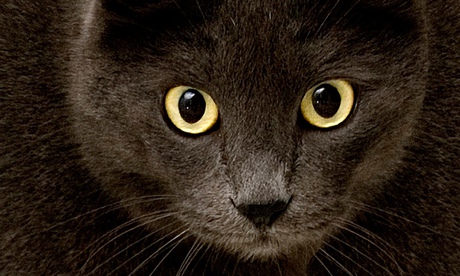
The New Zealand-born poet John Gallas recently published an enticing and timely collection of translations, 52 Euros. The “Euros”, 26 male and 26 female poets, range from Akhmatova and Apukhtin (“the Russian Oscar Wilde”) to Zhadovskaya and Jens Zetlitz, the latter represented by a splendidly raucous drinking song, Grapes Were Made to Grin the World (“Fillerup! … Gedditdown!”) Gallas stamps his translations with the vitality and lexical daring exhibited in his own poetry. A quieter poem such as this week’s choice, Cat (Gallas’s version, with Kurt Ganzl, of Baudelaire’s sonnet, Le Chat) is no exception, although its technical interventions are subtle.
Unrhymed, the translation is rich in assonance, the relationship of its sounds emphasised by the rhythmic compression. The several coined words make their presence felt, but they also participate in the alliterative melody: they are audible but without jarring.
“My dear cat” is a mild, almost formal opening. Other translators render Baudelaire’s adjective, beau (“Mon beau chat”) more accurately as “superb”, “fine”, “beautiful”. Gallas’s choice evokes a faintly dry, detached, if affectionate, tone. The emotions, withheld, converge onto the next part of the sentence, the urgent coaxing of “come to my hungry heart”. That “hungry” (“amoreux” in the original) asserts the speaker’s emotional need. There’s a hint of danger to the cat, perhaps, and certainly a hint of danger from the cat. “Sheathe your pawclaws …” the owner pleads. By bringing the two nouns together, velvet glove and sharp weaponry are compressed into one, memorably two-sided coin. The almost-rhyme (“pawclaws”/ “gorgeous”) completes the rather stunning effect.
The cat’s admirer is a sensualist, at times rapacious. He wants nothing less than to “plunge into” the cat’s eyes. The specific gemstone of the original, agate, disappears: Gallas’s cat has “gorgeous/ metal-and-marble mix eyes”. The alliteration is murmuringly ecstatic and, again, textures contrast suggestively. Marble – smooth, sheened, faintly veined or speckled, and with classical associations of stillness and permanence, contrasts, in an evocatively feline way, with the quicker, lighter, utilitarian substance, metal.
This metaphor continues, after the cat has become the human lover in the sestet, in the depiction of the woman’s look, which, “deep and cold, split-slices like a spear”. The credibility of cat-as-woman, woman as “amiable animal”, is dependent on a tactile register, allowing the explicit, slightly creepy verbs, “fondle” and “grope” a precise and delicate intensity. The resistance to cliche is absolute: the cat’s back is “sprung” (not “elastic”), the hand, “wander-slow”, is “lushed in pleasure” (not “drunk with pleasure”). As for Baudelaire, the culmination of the octet is in that straightforward, powerful and risky assertion beginning the sestet, “I see my woman”. But Gallas, even bolder, omits the tactful qualifier, “en esprit”.
The English sonnet concludes in an elusive manner, undoing some of the syntactical connections, introducing ambiguity. It can’t be the woman’s “look” which “all along, all around,/ her dark body swims …” Seemingly, her body is the subject of “swims”. There is solidity in this boundless body, and yet “air-faint” suggests something near-intangible. Baudelaire alludes to “dangerous perfume”. Gallas’s phrase “dangerous sweetness” expands both possibilities: the danger and the sweetness. It seem un-anchored at the end of the line, so that the sonnet resists closure, and goes on moving in an invisible, widening ripple. “Dark” in “her dark body” is less specific than “brun” in “son corps brun” and more potent with mystery. For all the physicality of the cat and the woman, the poem leaves us with a sense that both have retained some element that was indescribable – like electricity or sweetness – and that this element, which Gallas has managed to capture, was all along the subject of the poem.
Le Chat comes from the first section of Les Fleurs du mal, Spleen et Idéal. In the first of the Spleen poems the cat is a different creature altogether, thin and mangy, and the jaded, aged lovers lack all voluptuousness. It makes an interesting comparison.
“His book is a trove of the purest currency of Europe, poetry,” says the jacket-blurb of 52 Euros, reminding us that Europe is no mere marketplace but a great multi-weave of shared cultures, demanding to be treasured despite the bureaucracies that may provoke some Anglo-Saxon spleen.
Cat
My dear cat, come to my hungry heart;
sheathe your pawclaws
and let me plunge into your gorgeous
metal-and-marble mix eyes.
When my fingers fondle your head
and your sprung back, wander-slow,
and my hand, lushed in pleasure,
gropes your electric body,
I see my woman. Her look,
like yours, amiable animal,
deep and cold, split-slices like a spear,
and, all along, all around,
her dark body swims
air-faint, and a dangerous sweetness.

